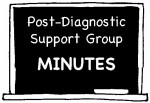 Minutes of the sixth Post-Diagnostic Support Group
Minutes of the sixth Post-Diagnostic Support Group
16th September 2015
Today’s group was attended by 22 people. 4 apologies were received prior to this.
Items discussed were:
The Art of the Possible event which took place on 1 September 2015.
Nobody present within today’s group attended the event. Linda explained the reason for the event and that details were on our website. A further event is scheduled to take place on 19 October 2015.
The National Autistic Society’s current campaign regarding petition for diagnosis crisis.
Linda explained to the group that the NAS had been successful in obtaining over 11,000 signatures and was now on to the next stage of the campaign where it is inviting people to contact their MPs.
Grandparent Study –
Linda explained to the group the two research studies (full details are provided on our website) and we had received booklets for grandparents to complete. Carly read out the abstract to the group. Linda explained that not much is currently known regarding Autism and Maturity and that some older adults were being misinterpreted by Older Adult Services. Esra Zivrali of the Kings College London will be attending our conference in November which could be a potential opportunity for people to discuss the study in more detail with her then. People were invited to take booklets and the booklets were given to David Reiser to distribute.
We then discussed a rolled over item from our previous group regarding housing and lobbying. Dream explained to the group his item regarding council tax. Sammy suggested that people request new carers assessments which could then in turn review their current housing situation.
Carly spoke to the group regarding our conference and advised that in order to attend places do need to be booked either by phoning Carly or email to secure a place. The venue was explained to the group in more detail and people were invited to book.
Linda then gave three books to David Reiser for Autism Inclusive: Neurotribes, M is for Autism and Marriage and Lasting Relationships. People were invited to do book reviews which could then be posted on our website.
We then moved on to the main topic of the day which was Post Traumatic Stress Disorder. Linda started by asking the group “What is it?” and read out the diagnostic criteria and asked the group if people could see why it is difficult for people with Autism in particular. Linda then explained “synchronicity” which is where memories from the past are as vivid as recent memories. Linda then asked “What causes it?” and explained that there is a debate on whether it has to be a life threatening event or not. In accordance with the current diagnostic criteria it does, however, it was discussed within the group that this may not always be the case, for example, domestic abuse could cause PTSD and the fact that trauma is subjective and what may be traumatic for one person may not be for another.
Linda explained to the group that NICE Guidelines were currently awaiting ICD-11 diagnostic criteria to be released before they review their current guidelines. NICE Guidelines were first set up in March 2005 and then reviewed in June 2015. They are due to be reviewed again in 2017.
Linda then went through the Primary Care screening and read out questions that GPs may ask. It was discussed within the group that perhaps PTSD and Autism was being missed and that it could possibly occur more frequently, however, there is no current research evidence available for this. Sometimes GP can mistake PTSD for an exacerbation of Autism. Linda explained that one way Mental Health Professionals make a diagnosis is by carrying out the Impact of Event Scales which has been revised for people with Intellectual Disabilities.
Dream advised the group on a recent Horizon programme (here).
Linda then advised the group she had done a literature search for peer reviewed journals which revealed one study in Turkey, and a single case study.
Linda advised that from what was available it appears that no study has been done regarding PTSD and Autism.
Carly then asked what treatment is available and Linda explained that NICE Guidelines recommend EMD-R (Eye Movement and Desensitisation Reprocessing) treatment.
The next two monthly post-diagnostic support group dates and times were given: 21 October 2015 between 11 am and 1 pm where the topic will be co-producing a package of post-diagnostic support and we welcome Elspeth Bromiley who will be joining us for this event to discuss in more detail. 25 November 2015 between 10.30 am and 12.30 pm where the main topic will be Coping with Christmas.
We then invited contributions from the group:
Caroline asked if Seasonal Affective Disorder is associated with Asperger Syndrome and Linda advised that she was unsure in terms of evidence base but that from what people had said to her this may be the case.
Daylight bulbs were discussed within the group as to their effectiveness for people with sensory sensitivity issues.
Dream asked if people with Autism Spectrum Disorder had more potential to suffer with PTSD as they may have higher cortisol levels and therefore a higher baseline level of anxiety. This was discussed within the group and examples of memory differences (synchronicity), information processing difference and over-thinking which can all have an affect.
We then closed the group by inviting people to stay informed via our website, film society, Facebook page and Twitter account.
Share This Post:







Leave a Reply